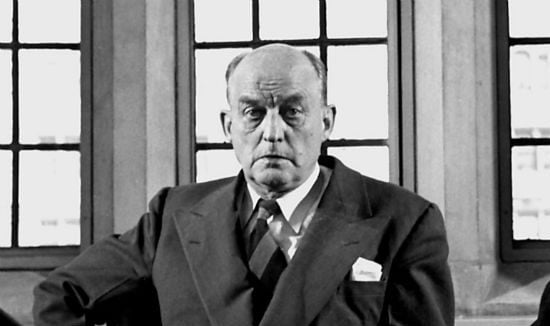I have to thank former FBI Director James Comey for indirectly leading me to this 1966 Commonweal interview with Reinhold Niebuhr.
Comey is an admirer of the great 20th-century theologian. Comey wrote his undergraduate thesis on Niebuhr and used a quote from him to open his recent book: “[Humanity’s] capacity for justice makes democracy possible, but [humanity’s] inclination to injustice makes democracy necessary.”
And back before he was fired in an attempt to obstruct the investigation into “this Russia thing,” Comey had a pseudonymous Twitter account under the name “ReinholdNiebuhr.”
Comey is now tweeting under his own name, and recently replied to the security-question-phishing meme about “five jobs I’ve had” with a tweet mentioning that he once worked as a “strike-replacement high school teacher.” This past history as a scab didn’t seem to be presented as a confession, or a regret, or an apology, just as an unremarkable item on a list.
That’s difficult to reconcile with Comey’s purported admiration for Niebuhr. Niebuhr was a fierce advocate for unions. That reflected his politics — he was a democratic socialist, after all. But more importantly it was a necessary corollary to his theology. Without strong labor unions, there would be no check on capital except for the benevolence of capitalists, and the inadequacy of benevolence as a check on power is a major theme of everything Niebuhr ever wrote or taught.
Such as, for example, that quote Comey himself chose as an epigraph: “[Humanity’s] capacity for justice makes democracy possible, but [humanity’s] inclination to injustice makes democracy necessary.”

Anyway, Comey’s past as a scab at least led me, as I said, to this Commonweal interview. There’s quite a bit to chew on in there, but I think the best bits are his remarks on white evangelicalism. Niebuhr is talking about Billy Graham’s evangelistic “crusades” in the early 1960s, but the critique here is timely and as timeless as the Gospels: “By their fruit ye shall know them.”
One of the ironic facts of American history is that both slavery and post-slavery injustice prospered in the states that were formed by two kinds of idealism — a Jeffersonian idealism and evangelistic Protestantism. All the horrible racial cruelties that are practiced in Alabama and Mississippi are done by people who have been “converted” five, six, seven, or eight times. …
Then along comes Billy Graham for his great evangelistic meeting. His manner is bland and he’s a great biblicist. He speaks in a convincing way and, while the choir sings softly, he tells the people to pray and to give their heart to Christ and sign the decision card. He tells them in the words of St. Paul that “if any man be in Christ, he will be a new creature.”
This is fantastic, because it shows the weakness of Protestantism — individualism. It deals with collective sin, particularly the race question, in purely individualistic terms. You can’t overcome race prejudice by simply signing a decision card. Yet Billy Graham tells them that if they sign the decision card they will become “color-blind.” Why is it that we see no evidence of the color-blindness when these people leave the evangelistic meetings?
What Niebuhr condemns here as “individualism” is the idea of religion — of “salvation” — without justice. He was as unconvinced of the possibility of such a thing as the prophet Isaiah was. He sometimes called this idea the “heresy” of individualism.
Niebuhr uses that phrase in the video below, quoting Pope John XXIII’s maxim that, in society, “love is the motive and justice the instrument.” Evangelical individualism, he believed, divorced love from justice, turning it into something sentimental and gormless and vapid.
This video is grainy. The audio quality is not good and the automated captioning is so random it can make it even harder to understand. But for all that, this is still very much worth watching. The video is from WTTW in Chicago, but I think the program — “Our Protestant Heritage” — was produced in New York. This was recorded a week after the Birmingham church bombing that killed four girls in September 1963. Niebuhr and James Baldwin are, in the moment, responding to current events, but it’s sobering and depressing to realize how timely and relevant their comments seem for us today.
“On the basis of the evidence,” Baldwin says, “… the only people in the country at the moment who believe either in Christianity or in the country are the most despised minority in it. … It’s ironical, I would say, that the people who were slaves here, the most beaten and despised people here, and for so long, should be at this moment absolutely the only hope this country has.”















